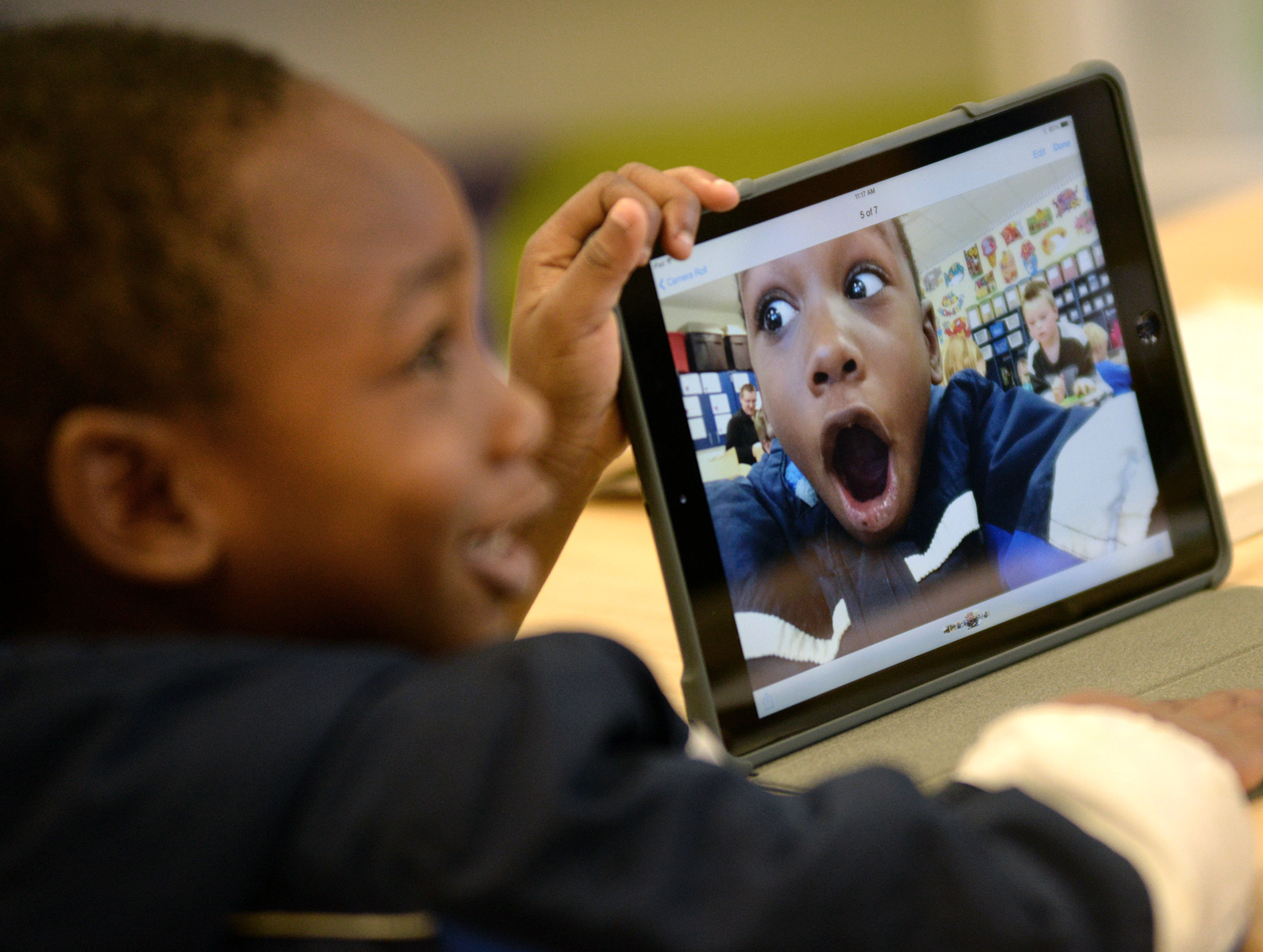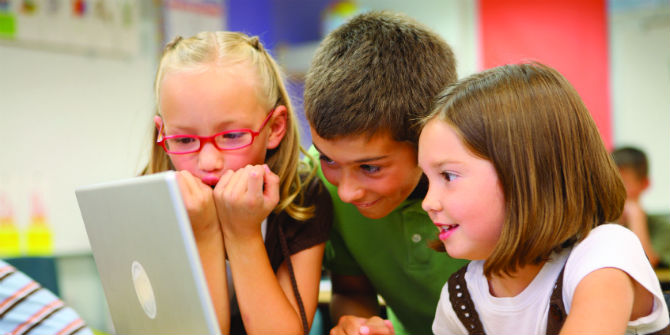 Representatives of the Internet and technology companies that were called upon by the European Commission three years ago to take action to improve internet the safety of children online met today, 26 June, to evaluate progress. Our Sonia Livingstone shares here what she presented to them from the latest research showing that risks have increased and that, while digital skills have improved somewhat, support for parents and children is still not consistent or sufficient.
Representatives of the Internet and technology companies that were called upon by the European Commission three years ago to take action to improve internet the safety of children online met today, 26 June, to evaluate progress. Our Sonia Livingstone shares here what she presented to them from the latest research showing that risks have increased and that, while digital skills have improved somewhat, support for parents and children is still not consistent or sufficient.
Leading representatives of the internet industry met in Brussels to evaluate their progress on a ‘Better Internet for Children’. They included Google, Facebook, Telefonica, Samsung and many others – this being the latest in some 25 high level meetings held following European Commission Vice President Neelie Kroes’ call on companies to collaborate to make the internet a better place for kids in 2011. Speaking for the EU Kids Online network, I presented the latest evidence, which shows some progress on children’s digital skills, uneven improvements in parental support, but also increases in the online risk of harm to children, especially in some countries and especially for girls. So as I explain below, there’s more for the CEO Coalition to do.
The Coalition’s efforts have centred on the five key principles: (i) Simple and robust reporting tools; (ii) Age-appropriate privacy settings; (iii) Wider use of content classification; (iv) Wider availability and use of parental controls; and (v) Effective takedown of child abuse material. In 2012, the pan-European research network, EU Kids Online, analysed its survey of 25000 children to provide a state-of-the-art assessment of how industry was doing, focusing just on the first four principles. This revealed plenty of challenges regarding the design, availability and user-friendliness of the tools and services industry provided for children’s online safety.
The status of use and risks
Have things improved in the last few years? Drawing on Net Children Go Mobile’s 2014 survey of 9-16 year olds in seven countries, and comparing these findings to the earlier EU Kids Online survey, my presentation in Brussels showed that:
-

source: Net Children Go Mobile report 2014 Internet access is now far more mobile and personal. In 2010, on average half of 9-16 year olds in the seven countries surveyed in 2013/14[1] ever used the internet in their bedroom. Now 2/3 have access, and around half use it there every day.
- Contrary to popular myth, Facebook is far from finished – indeed, its use is growing in some countries. More important for the principles of the CEO Coalition, 1/4 of 9-10 year olds and over half of 11-12 year olds use social networking sites (SNS) – with 22% and 53% on Facebook respectively, despite being ‘under-age’ and so supposedly prevented from such use by Facebook itself.
- Possibly in consequence, children’s reported risk of harm online has also increased – with variations by risk type, gender, age and country. Children report increased encounters with online hate messages, pro-anorexia sites and, to a lesser degree, porn, cyberbullying and meeting online contacts offline. Only sexual messaging has decreased (except in Denmark).
Arguably the increase in risk is because of parallel increase in opportunities. However, the overall proportion bothered or upset by something online has also risen slightly – especially among girls and among older teens.
Plenty of panic, insufficient support
Clearly, children cannot 100% manage their online environment and this is a matter both of education and of the design of the online environment. In recent years, children have increased their digital and safety skills – evaluating websites, finding safety info, blocking people, managing their privacy settings and so forth. But there remain considerable inequalities in skills by gender, age and country – and more user-friendly tools are still needed. Further, as with any educational mission, a minority of children are ‘hard to reach’, and they are often at risk offline as well as online. It doesn’t help that media education in Europe is far from meeting the challenge of educating young citizens for the digital age, as I discussed recently.
-

source: Net Children Go Mobile report 2014 Disappointing to awareness-raisers targeting parents, children report little change in their parents’ actions to support their internet safety. Danish parents do a little less than before; British and Irish parents do a little more social support; Belgian parents use more parental controls. But generally, parents appear to prefer talking about internet safety with their children over use of parental controls – in all countries and for all age groups.
- In addition, new qualitative research from EU Kids Online in nine countries shows that while children are doing their best to cope with online problematic situations, but that they need more support from parents, schools and industry. In their embarrassment, parents often confuse more than enlighten. The media don’t help – panicking children and their parents about the rarest risks of harm while doing little to encourage thoughtful digital citizenship or responsible social norms.
- Meanwhile children are puzzling over how to manage the tricky situations they encounter, many of which begin as something fun if a bit naughty but can too-easily escalate out of control, sometimes resulting in harmful situations. So children are learning the ‘rules’ of internet use, but they struggle to work out how to apply them – when exactly should they intervene, or tell someone, or leave an online interaction? Should they retaliate, even? ‘Reading’ the social situation is hard for all of us, especially in the often-opaque online environment.
The CEO Coalition is trying to meet children’s needs and rights within the wider framework for internet governance, which is no easy matter, both because this places an addition burden (financial, regulatory, technical) on the industry and because child protection is often seen as a Trojan Horse for censoring adult freedoms rather than a genuine means of delivering children’s rights to participation as well as protection. It is becoming obvious to many stakeholders that rather than designing dedicated internet safety resources, it would be better to incorporate digital skills and literacies into existing provision – as part of sexual and health education, taking on board by helplines and by social services addressing vulnerable youth, etc.
More work for the Coalition
But there is still much for the CEO Coalition to do. Only coordinated European action can provide cost-effective safety tools, safety by design, shared best practice on helplines and hotlines, scalable content classification schemes, and so forth. For this reason, Robert Madelin, Director General of DG CONNECT, argued that empowerment for kids online will and must remain firmly on the European Commission’s agenda. He called on all players within industry, along with public and third sector stakeholders, to contribute to the wider cooperative effort, vital if Europe’s non-legislative, voluntary approach to a ‘Better Internet for Kids’ can be effective and scalable.
Madelin’s hopes for the continued flourishing of the CEO Coalition, however, may have dismayed those who hoped this would be the last meeting of the Coalition. But although in recent years, the industry has done a lot, the job is not yet done – and perhaps it never can be. As Brian O’Neill, from the Dublin Institute of Technology and the EU Kids Online Management Group, found in evaluating the parallel but heavily-overlapping ICT Coalition, recent years have seen considerable progress. But this is a fast-changing socio-technical environment. The challenge is to ensure recent efforts are maintained and developed as more and more children come to rely on the internet for every aspect of their lives.
[1] Belgium, Denmark, Italy, Ireland, Portugal, Romania and the UK.
This article gives the views of the author and does not represent the position of the LSE Media Policy Project blog, nor of the London School of Economics.





